【最新】冀教版七年级英语下册Unit2 动词过去式变化
冀教版七年级英语下册unit2
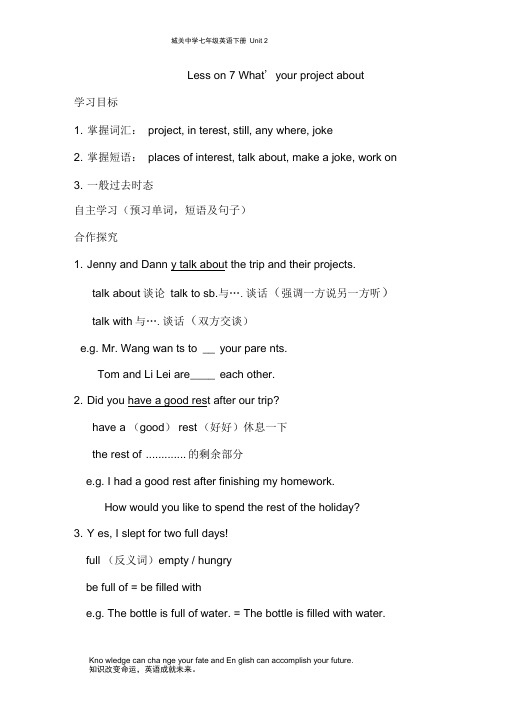
Less on 7 What' your project about学习目标1. 掌握词汇:project, in terest, still, any where, joke2. 掌握短语:places of interest, talk about, make a joke, work on3. 一般过去时态自主学习(预习单词,短语及句子)合作探究1. Jenny and Dann y talk about the trip and their projects.talk about谈论talk to sb.与….谈话(强调一方说另一方听)talk with与….谈话(双方交谈)e.g. Mr. Wang wan ts to __ your pare nts.Tom and Li Lei are ____ each other.2. Did you have a good rest after our trip?have a (good) rest (好好)休息一下the rest of ............. 的剩余部分e.g. I had a good rest after finishing my homework.How would you like to spend the rest of the holiday?3. Y es, I slept for two full days!full (反义词)empty / hungrybe full of = be filled withe.g. The bottle is full of water. = The bottle is filled with water.4. You can find donu ts anywhere in Can ada.e.g. Can you find the book any where? (在任何地方)I have seen it somewhere.(在某个地方)I ' ve looked for my walletsverywhere but I can ' t find i(.在每个地方;到处)5. Let ' s go to the library work on our projects.work on doing sth.从事于...;努力改善或完成e.g. He is worki ng on read ing a new no vel these days.6. Can you tran slate any jokes in to En glishtran slate ….in to 把•丁翻译成….translator 翻译家translation (n)翻译e.g. Can you tran slate the En glish in structi ons in to Chin ese?巩固练习用所学单词的适当形式填空1. He ' s working some new_____ (project).2. The girl is very ____ (in terest) in western music.3. Do you ____ (still) live in that small city?4. She n ever visits ___ (somewhere) in terest ing.5. She is laughi ng and ___ (joke) with the childre n.6. You should have a good r __ after a long walk.7. She still can ' t b ________ that man is an actor.8. Let ' s play basketball. ---- Good i ______ .反思: _____________________________________________________Lesson 8 Marco Polo and Silk Road学习目标:1. 掌握单词:discover, invent, age, Europe, Asia, journey, king, coal2. 掌握短语:at the age of be new to3. 一般过去时态(主语+动词过去式+宾语+其他)E.g.: In 1275, Marco Polo travelled to Beiji ng.4. 重点句型(1) At the age of 17, he went to Chi na.(2) The Chin ese discovered coal and inven ted paper.(3) These thi ngs were new to Marco Polo.(4) I hope to write a book like that someday.自主学习预习单词,短语及句子合作探究1. at the age of…/ when sb. was … years old 在…岁时E.g.: He moved to London at the age of 20 (whe n he was 20 years old).2. discover发现;了解invent发明;创造E.g.: He discovered a new star.Who inven ted the teleph one?3. be new to sb.对…陌生E.g.:The movie is new to me.4. hope to do sth.希望做某事E.g.:I hope to see you again.5. other其他的;别的one…the other —个是…另一个是…E.g.: I have two computers, one is big, the other is small. 辨析:other, another, the otherother 其他的,另外的He went to the park with other boys.another (三者或以上)另一个He takes another apple.the other (两者中的)另一个They live on the other side of the street. 巩固练习一.根据汉语提示完成句子。
七年级下册英语第二单元语法

七年级下册英语第二单元语法
以下是七年级下册英语第二单元的语法知识:
1. 现在进行时(Continuous Tense):表示正在进行的动作或正在发生的事情。
结构为“be动词(am/is/are)+动词的现在分词形式(ing)”。
2. 动词的现在分词形式(Present Participle):在英语中,动词有四种形式,分别是原形、过去式、现在分词和过去分词。
现在分词形式通常用于构成现在进行时和被动语态等。
3. 动词不定式(Infinitive):在英语中,动词不定式是一种非谓语形式,用于表示动词的动作尚未发生或尚未完成。
动词不定式有三种形式,分别是“to+动词原形”、“to+动词的现在分词形式”和“to+动词的过去分词形式”。
4. 规则动词和不规则动词:在英语中,大多数动词都有规则的形式变化,即通过添加-ed或-ing等后缀来构成过去式、过去分词和现在分词。
但是,有一些动词的形式变化是不规则的,例如“run-ran-run”、“write-wrote-written”等。
5. 动词时态:在英语中,根据动作发生的时间和状态,可以使用不同的时态来表示。
七年级下册英语第二单元主要介绍了现在进行时这一时态。
以上是七年级下册英语第二单元的语法知识,通过学习和掌握这些知识,可以更好地理解该单元的课文和句型,提高英语应用能力。
七年级下册冀教版英语unit2知识点总结

七年级下册冀教版英语unit2知识点总结七年级下册冀教版英语Unit 2知识点总结Unit 2的课文涵盖了描述人物的外貌、性格、兴趣爱好等话题,是一个十分实用的学习模块。
在本文中,我们将对Unit 2的知识点进行归纳总结,帮助大家更好地掌握英语。
1. 形容词的比较级和最高级课文中有很多形容词的比较级和最高级。
比如,“tall”可以变为“taller”和“tallest”,“interesting”可以变为“more interesting”和“the most interesting”。
需要注意的是,在使用比较级和最高级时,要遵循以下规则:(1) 一般在单音节形容词和部分双音节形容词后面加-er和-est。
如:tall – taller – tallest;happy – happier – happiest。
(2) 以辅音字母+y结尾的形容词,将y变成i再加-er和-est。
如:heavy – heavier – heaviest;happy – happier – happiest。
(3) 以“e”结尾的形容词,直接加-r和-st。
如:large – larger –largest;fine – finer – finest。
(4) 以“y”结尾的形容词,且前面是元音字母,直接加-r和-st。
如:gray – grayer – grayest;gay – gayer – gayest。
(5) 以“er”、“ow”结尾的双音节和部分三音节词,用more和most构成比较级和最高级。
如:clever –more clever –most clever;narrow – more narrow – most narrow。
2. 物主代词的用法物主代词用来表示“属于某人/物”的含义。
在课文中,我们可以看到“his”、“her”、“my”等物主代词的使用。
需要注意的是:(1) 物主代词的单数形式和复数形式不同。
冀教版七年级英语下册Unit2 动词过去式变化
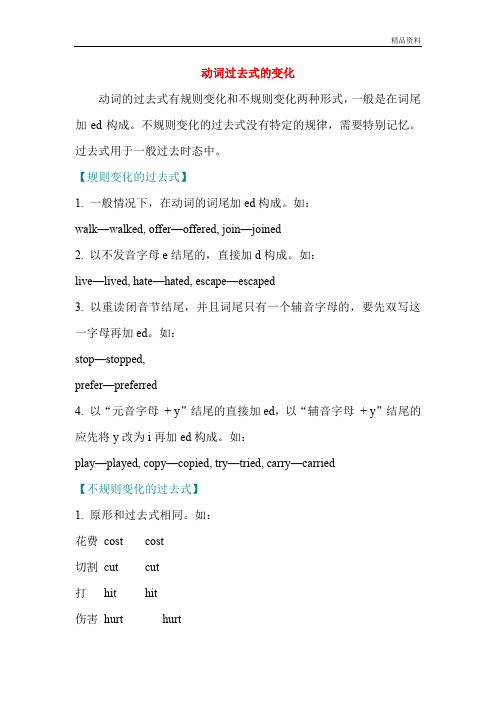
动词过去式的变化动词的过去式有规则变化和不规则变化两种形式,一般是在词尾加ed构成。
不规则变化的过去式没有特定的规律,需要特别记忆。
过去式用于一般过去时态中。
【规则变化的过去式】1. 一般情况下,在动词的词尾加ed构成。
如:walk—walked, offer—offered, join—joined2. 以不发音字母e结尾的,直接加d构成。
如:live—lived, hate—hated, escape—escaped3. 以重读闭音节结尾,并且词尾只有一个辅音字母的,要先双写这一字母再加ed。
如:stop—stopped,prefer—preferred4. 以“元音字母+ y”结尾的直接加ed,以“辅音字母+ y”结尾的应先将y改为i再加ed构成。
如:play—played, copy—copied, try—tried, carry—carried【不规则变化的过去式】1. 原形和过去式相同。
如:花费cost cost切割cut cut打hit hit伤害hurt hurt2. 过去式字母o改为a。
如:成为become became来come came3. 过去式为ought结尾的。
如:带来bring brought买buy bought战斗fight fought想think thought4. 过去式为aught结尾的。
如:抓住catch caught教teach taught5. 过去式将eep改为ept。
如:保持keep kept打扫sweep swept6. 过去式字母i改为a。
如:下沉sink sank游泳swim swam7. 过去式字母ow改为ew。
如:知道know knew投掷throw threw吸blow blew种植grow grew。
冀教版七年级英语下册各单元知识点归纳汇总
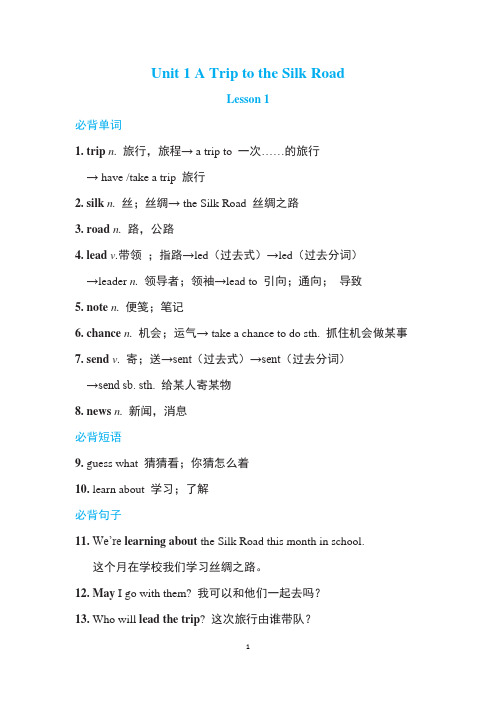
Unit 1 A Trip to the Silk RoadLesson 1必背单词1. trip n. 旅行,旅程→ a trip to 一次……的旅行→ have /take a trip 旅行2. silk n. 丝;丝绸→ the Silk Road 丝绸之路3. road n. 路,公路4. lead v.带领;指路→led(过去式)→led(过去分词)→leader n. 领导者;领袖→lead to 引向;通向;导致5. note n. 便笺;笔记6. chance n. 机会;运气→ take a chance to do sth. 抓住机会做某事7. send v. 寄;送→sent(过去式)→sent(过去分词)→send sb. sth. 给某人寄某物8. news n. 新闻,消息必背短语9. guess what 猜猜看;你猜怎么着10. learn about 学习;了解必背句子11. We’re learning about the Silk Road this month in school.这个月在学校我们学习丝绸之路。
12. May I go with them? 我可以和他们一起去吗?13. Who will lead the trip? 这次旅行由谁带队?Lesson 2必背单词1. exciting adj.使人激动的(用来修饰物)→ excited adj.感到兴奋的(用来修饰人)2. along prep.沿着……→ walk along 沿着……走3. kilometre n. 千米,公里4. special adj.特殊的;特别的→specially adv. 特殊地;特别地5. culture n. 文化6. arrive v. 到达,抵达→ arrive in 到达(大地点) → arrive at 到达(小地点)7. leave v. 动身;出发;离开→ left (过去式)→ left (过去分词)→ leave for sp. 前往某地;动身去某地必背短语8. plan for the trip 关于旅行的计划9. come back to 回到……必背句子10. How exciting! 多么令人激动!11. How far is it from Beijing to Xi’an?从北京到西安有多远?12. But we don’t have enough time to see it all.但是我们没有足够的时间去看它的全貌。
冀教版英语七年级下册Unit 2 单元知识点总结与检测题

Unit 2 单元知识点总结与检测题一.重要句子与短语。
Here is/are +名词be good at+Ving/名词try one's best be new toAt the age of........ I can't wait to eat.二.语法:一般过去时与过去时动词不规则变化。
1.Eg: I was happy. I wasn't happy.(否定句)Was I happy?(疑问句) 回答Yes ,you were./No,you weren't.2.Example:He played basketball. He didn't play basketball.Did he play basketball? Yes,he did./No,he didn't.3.规则动词变化:~ed,~d,......learn-learned hear-heard guess - guessed move--moved travel--travelled last--lasted work--worked realize- realized open-opened learn-learned4.不规则动词的变化。
sleep--slept do--did be--was/were go--went meet--met bring--brought build-built give-gavemake-made get-got go-went see-saw take-took have-had 参考教材第149页语法。
三.练习题。
(一).选择题。
(每题2分,共30分)( )1.She many books in the library yesterday.A.findB.foundC.findingD.finds( )2.Italy is in Europe and China is in .A.countryB.AmericaC.Africa( )3.Hi ,Lucy! I you an e-mail yesterday.A.sendB.sentC.sendingD.sends( )4.My father_________ill yesterday.A.isn't B.aren't C.wasn't D.weren't( )5.______ your parents at home last week﹖A.Is B.Was C.Are D.Were( )6.The twins _______ in Dalian last year.They ______ here now.A.are; were B.were; are C.was; are D.were; was( )7.________ your father at work the day __________ yesterday(前天)﹖A.Was; before B.Is; before C.Was; after D.Is; after( )8.—Who was on duty last Friday﹖—____________.A.I am B.I was C.Yes, I was D.No, I wasn't( )9. I cleaned my classroom ___________.A . with three hoursB .three hours ago C. in three hours D. three hours before ( ) 10. I came _______ my house two days ago .A. back onB. back to C . to back D . back( ) 11 . ___________? He did some reading at home.A .What does your father do yesterday eveningB .What does your brother do in theschoolC .What did your brother do over the weekend D. Where did your brother go last Sunday ( )12. What did you do ________ ? I went to the movies.A. next morningB. over the weekend C .in the weekend D .next Monday( ) 13. The koala sleeps _______,but gets up _________.A . during the day; at the eveningB . at day ;during nightC . in the day ;during the evening D. during the day ; at night( ) 14. Last week, my good friend and I _______ a movie.A. seeB. sawC. watchD. looked( ) 15. Last Sunday, my aunt cooked dinner ______ me.A. toB. onC. forD. at(二).填空题。
冀教版初一英语下册第一二单元重难点

Lesson 11、lead v.带领;指路过去式为led,过去分词为led。
(1)、lead to... (道路)通向;导致All roads lead to Rome.条条大路通罗马。
(2)、lead...to...把……带到,领到I’ll lead you to the waiting room. Please follow me.我将带你到等候室。
请跟我来。
2、chance n.机会;运气(1)、chance意为“机会、机遇”。
There will be a chance for us to look around the school.我们将有机会参观这个学校。
(2)、表示“有机会做某事”时,chance后可接“to do sth.”或“of doing sth.”。
I will have the chance of visiting Beijing tomorrow.明天我将有机会参观北京。
Whenever(无论何时) you have a chance to speak English, you should take it.无论何时你有机会说英语,你都应该抓住它。
3、send v.送;寄过去式sent; 过去分词sent。
I sent some photos to my pen pal yesterday.我昨天给我的笔友寄了些照片。
send 后可接双宾语,“send sb. sth.”,sth. (某物)为直接宾语,sb.(某人)为间接宾语。
send sb. sth.(= send sth.to sb.)意为“寄(送)给某人某物”。
(1)、I want to send my mother a letter.I want to send a letter to my mother.我想给我的妈妈寄一封信。
(2)、I sent him an email.我给他发了一封邮件。
比较:与send用法类似,可接双宾语的动词还有give, show, pass, lend, tell等。
冀教版七年级英语下册Unit 2 各课重点

冀教版七年级下册Unit 2重点短语&固定搭配L7sleep - slept 睡觉have- had 有hear - heard 听见places of interest 名胜古迹talk about 谈论make a joke/ make jokes句开玩笑,讲笑话be/get ready for + 名词为...做准备work on 从事于... be/get ready to do 准备去做...have a (good)rest (好好)休息work 不可数名词job 可数名词感官动词:feel,taste(尝起来),look(看起来),smell(问起来),sound(听起来),touch(摸起来)后接形容词A lot of = lots of + n. 许多... a lot = ... very much 非常be good at = do well in + n/doing 擅长于...L8Europe n. 欧洲→European n./adj. 欧洲的,欧洲人Asia n. 亚洲→Asian n./adj. 亚洲的,亚洲人meet - met 遇见are - were 是bring - brought 带来write - wrote 写at the age of ... 在几岁时between A and B 在A和B之间discover v. 发现be new to 对...陌生invent v. 发明hope to do 希望做某事take 带走(由近及远)bring 带来(由远及近)carry 携带(无方向性)would like to do 想要做... L9build(built)v. 建造→building n. 建筑important adj. →importance n. 重要性more 原形:good/well 最高级:besttry/do one’s best 尽力tell sb not to do sth 告诉某人不要做某事a long time ago 很久以前well done. 做到好。
冀教版七年级英语下册Unit 2 语法专题练习

考点 2【重点】一般过去时的句子结构
分类
构成
例句
肯 定
主语 + was /were +其他;主语 + 动
There was a car race last year. 去年有一场汽车比赛。
句 词的过去式+其他 We watched a movie yesterday.
昨天我们看了一场电影。
否 主语+ was /were + They weren’t here just now.
典例 1 Beijing and Zhangjiakou ____B____applying to
(申请)host the 2022 Winter Olympic Games in 2013.
A.begin
B.began
C.have begun
D.had begun
【点拨】本题采用语法判定法。由in 2013可知应为一般过 去时。句意为:“北京和张家口2013年开始申请举办2022 年冬季奥运会。”
14.We visited the Summer Palace three days ago.(对画线部分 提问) __W__h_e_n__ ___d_i_d___ ___y_o_u___visit the Summer Palace?
15.I played my iPad in the room.(对画线部分提问) _W__h_a_t___ ____d_id___ you ___d_o____in the room?
冀教版英语七年级下册第二单元知识点总结
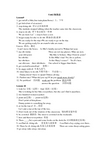
Unit2知识点Lesson91. get on/off a (bike,bus train,plane/horse) 上,下车2. get in(to)/out of a(car,taxi)3. stop doing sth. 停止正在做的事The students stopped talking when the teacher came into the classroom.4. stop to do sth. 停下来去做另一件事We are tired. Let’s stop to have a rest.5. be/get ready for sth./ to do sth 准备好(做)某事We are ready for the trip.=We are ready to go on the trip.We are getting ready for an exam/to take an exam..6.move 移动,搬迁I can’t move the boxes. Li Mei’s family moved to Wuhan last year.7. my sth =mine These are not my glasses. Mine are new.your sth=yours My bike is broken.. May I borrow yours?his sth=his Is this Mike’s hat? No, his is yellow.her sth=hers Is this Mary’s eraser? Yes.It’s hers.our sth=ours their sth=theirs Our school is bigger than theirs.8. get excited/worried/sad 变得…9. be angry with sb 生某人的气10. (don’t)have to do sth.不得不做…不必做…;Danny doesn’t have to speak Chinese all day.11. Pardon (me)? What did you say?/Can you speak more slowly?12. No problem! 没问题work out the problem 解决问题answer the question 回答问题Lesson 101. look for寻找(过程)find 找到(结果)She is looking for her bike everywhere, but she can’t find it anywhere.2. two hundred women teachers3. point at(近指) ;point to(远指)Don’t point at him,please.Danny points to something far away.4. at /on the top of 在…顶部Let’s put a star at the top of the tree.5. Don’t look out of the window of the classroom. 别向教室窗外看6. be crowded 拥挤的The street is crowded on the weekends.7. here and there=everywhere 到处8. There ____(be) a pen and some books on the desk.(be动词根据就近原则)9. see/find sb. doing sth. 看见某人做某事I see/find a boy crying over there..10. There be sb. doing sth.有某人在做某事There are some sheep eating grass.11.go away ;take away; run away1.on the farm在农场live on the twelfth floor住在第12层楼2.suddenly(adv)突然(常用语句首或句末)Suddenly, I heard someone calling“help”突然,我听到有人喊救命3. listen t o…听(过程)hear 听见(结果)hear sb. doing sth.______(听)!Can you_____(听见)someone ________(唱) in the next room?4.voice (n) 嗓音Deng Lijun has a sweet voice.5.scare(v) 惊吓---(adj)scared 害怕的You scared me. 你吓了我一跳Don’t be scared. 别害怕be scared of sb/sth 害怕…The girl is scared of dogs/doctors.be scared of doing/to do sth害怕做某事I’m scared of going out/to go out at night.6.Of course=Sure=Certainly 当然7.interesting places= places of interest 名胜古迹8.hope+将来是从句. I hope you will enjoy your trip .我希望你旅行愉快hope to do sth. I hope to see you soon.我希望很快见到你I hope so. .希望如此I hope not.希望别那样9.enjoy doing sth.=have fun doing sth. 喜欢做某事Children enjoy watching TV.10. I’m not sure. 我不确定11.a lot of=lots of 修饰可数名词复数或不可数名词Lesson 121.wait for sb./sth.to do sth.“等待某人/某物干某事”;服务员waiter(男) waitress(女) We’re waiting for the bus to come.2.finally=at last=in the end “最后,终于”3.something to eat/drink “吃的/喝的东西”4.one’s own sth.“某人自己的东西”This is my own computer5.Anything else= What else would you like? 你还要点别的吗?else后置修饰不定代词及特殊问词6.Please call me when you arrive.三个“到达”,只有arrive可单独使用,后不跟地点Lesson 131.“可能”Maybe(用于句首)=主语+may beMaybe Mr Smith is in the library.= Mr Smith may be in the library.2.quiet(adj)---(adv)quietly“安静的,安静地”Please be/keep quiet. 请安静/请保持安静They are reading newspapers quietly. 他们在静悄悄地看报。
七年级下册英语冀教版知识点

七年级下册英语冀教版知识点七年级下册英语冀教版的学习内容丰富多样,涵盖了语法、词汇、句型、听力、阅读和写作等多个方面。
以下是对这些知识点的详细梳理。
一、语法1、一般过去时一般过去时表示过去发生的动作或存在的状态。
其构成是主语+动词的过去式+其他。
动词过去式的变化规则:一般在动词末尾加 ed,如:play played 。
结尾是 e 的动词加 d,如:like liked 。
重读闭音节词,双写末尾辅音字母再加 ed,如:stop stopped 。
不规则动词的过去式需要特殊记忆,如:go went , have had 。
2、现在进行时现在进行时表示正在进行的动作。
其构成是主语+be(am/is/are)+动词的现在分词+其他。
现在分词的构成规则:一般在动词末尾加 ing,如:read reading 。
以不发音的 e 结尾的动词,去 e 加 ing,如:write writing 。
重读闭音节词,双写末尾辅音字母再加 ing,如:run running 。
3、形容词和副词的比较级和最高级比较级用于两者之间的比较,最高级用于三者或三者以上的比较。
比较级的构成规则:一般在词尾加 er,如:tall taller 。
以重读闭音节结尾且末尾只有一个辅音字母的形容词,双写这个辅音字母再加 er,如:big bigger 。
以“辅音字母+y”结尾的形容词,把 y 变为 i 再加 er,如:heavy heavier 。
最高级的构成规则:一般在词尾加 est,如:tall tallest 。
以重读闭音节结尾且末尾只有一个辅音字母的形容词,双写这个辅音字母再加 est,如:big biggest 。
以“辅音字母+y”结尾的形容词,把 y 变为 i 再加 est,如:heavy heaviest 。
不规则的比较级和最高级需要特殊记忆,如:good/well better best , bad/ill worse worst 。
冀教版七年级英语下册课件 Unit 2 语法写作课件

语法点集中攻坚 单元要点大本营 单元一法练写作
语法点集中攻坚
一、动词的过去式
考点 1【难点】规则动词的过去式的构成
规则动词的过去式的变化规则
1.直接加-ed。
eg:look—looked watch—watched
2.以不发音的字母-e结尾的 eg: like—liked
典例 2 —Don’t you see the sign “No Parking!” on the
right?
—Sorry, I ____B____.But now I know parking here is not right. (绵阳)
A.don’t B.didn’t C.hadn’t D.doesn’t
【点拨】采用正确把握语境法。考查句子时态。句意:— —你没看见右边的标识“禁止停车!”吗?——对不起, 我没看到。但是现在我知道把车停在这儿是不对的。根据 语境可知没有看到标识是发生在过去的事情,所以采用过 去时,排除A和D。另外,本句完整句子为I didn't see the sign. 所以排除C。
didn’t.
特殊
Where was he just now?
疑问 特殊疑问词+一般疑问句? 刚才他在哪儿?
句
When did he go home?
他何时回家的?
特色 土方法
含实义动词句子的一般过去时的用法口诀: 句子一般过去时,表示过去发生事; 句中谓语过去式,过去时间是标记; 否定句,很简单,主语之后didn’t添; 疑问构成有方法,did放在主语前; 还有一点不能忘,后面动词要还原。
典例 1 Beijing and Zhangjiakou ____B____applying to
冀教版七年级英语下词性转换

1. China (形容词) Chinese2. Chinese (复数) Chinese3. may (过去式) might4. plan (现在分词) planning5. they (宾格) them6. thank (名词) thanks7. lead (过去式) led (过去分词) led 8. excite (形容词) excited / exciting9. send (过去式) sent (过去分词) sent 10. tell (过去式) told (过去分词) told11. meet (过去式) met (过去分词) met 12. meet (同音词) meat13. one (序数词) first 14. culture (形容词) cultural 15. visit (形容词) visiting 16. visit (名词) visitor 17. twelve (序数词) twelfth 18. five (序数词) fifth 19. long (反义词) short 20. long (名词) length 21. goose (复数) geese22. tooth (复数) teeth 23. foot (复数) feet 24. hit (过去式) hit (过去分词) hit 25. hit (现在分词) hitting 26. ancient (反义词) modern 27. ancient (同义词) old 28. ring (过去式) rang (过去分词) rung 29. dish (复数) dishes30. tour (名词) tourist 31. photo (复数) photos 32. left (反义词) right33. lead (名词) leader 34. will (否定形式) won’t35. cross (过去式) crossed (过去分词) crossed 36. wide (名词) width37. baby (复数) babies 38. beauty (形容词) beautiful 39. mean (名词) meaning 40. amaze (形容词) amazed / amazing 41. main (副词) mainly42. same (反义词) different 43. ride (过去式) rode (过去分词) ridden44. safe (名词) safety 45. safe (副词) safely 46. safe (反义词) dangerous47. safety (反义词) danger 48. real (副词) really 49. fun (形容词) funny50. diary (复数) diaries 51. last (反义词) first / next52. go (过去式) went (过去分词) gone 53. colour (形容词) colourful54. build (名词) building / builder 55. build (过去式) built (过去分词) built56. hold (过去式) held (过去分词) held 57. see (过去式) saw (过去分词) seen 58. eat (过去式) ate (过去分词) eaten1. have (过去式) had (过去分词) had2. do (过去式) did (过去分词) done3. sleep (过去式) slept (过去分词) slept4. learn (过去式) learned (过去分词) learned5. hear (过去式) heard (过去分词) heard6. make (现在分词) making7. library (复数) libraries 8. Italy (形容词) Italian 9. Europe (形容词) European 10. Asia (形容词) Asian 11. India (形容词) Indian 12. America (形容词) American 13. journey (同义词) trip 14. cover (反义词) discover15. invent (名词) invention / inventor 16. bring (过去式) brought (过去分词) brought 17.scarf (复数) scarfs / scarves 18. describe (名词) description19. important (名词) importance 20. ride (现在分词) riding21. ride (过去式) rode (过去分词) ridden 22. rode (同音词) road23. soft (反义词) hard 24.include (介词) including25. many/much (比较级) more (最高级) most 26. rich (反义词) poor27. west (形容词) western 28. dance (名词) dancer 29. drive (名词) driver30. work (名词) worker 31. play (名词) player 32. teach (名词) teacher33. visit (名词) visitor 34. sing (名词) singer35.give (过去式) gave (过去分词) given 36. maybe (同义词) perhaps37. start (同义词) begin 38. get (过去式) got (过去分词) got / gotten39. especial (副词) especially 40. produce (名词) product 41. story (复数) stories 42. interest (形容词) interested / interesting 43. see (同音词) sea44. make (过去式) made (过去分词) made 45. true (反义词) false46. true (副词) truly 47. true (名词) truth 48. real (反义词) imaginary49. real (副词) really 50. take (过去式) took (过去分词) taken51. cost (过去式) cost (过去分词) cost 52. spend (过去式) spent (过去分词) spent 53. pay (过去式) paid (过去分词) paid 54. anyone (同义词) anybody55. write (过去式) wrote (过去分词) written 56. write (名词) writer57. write (现在分词) writing 58. write (同音词) right 59. country (复数) countries 60. city (复数) cities 61.read (过去式) read (过去分词) read62. own (同义词) have 63. own (名词) owner 64. advise (名词) advice 65. suggest (名词) suggestion1. life (复数) lives2. busy (反义词) free3. start (反义词) finish4. win (过去式) won (过去分词) won5. win (反义词) lose6. win (名词) winner7. win (现在分词) winning8. won (同音词) one9. social (名词) society10. I (反身代词) myself 11. wood (形容词) wooden12. print (名词) printer / printing 13. educate (名词) education14. different (名词) difference 15. you (反身代词) yourself16. family (复数) families 17. drop (过去式) dropped (过去分词) dropped18. drop (现在分词) dropping 19. possible (副词) possibly20. possible (反义词) impossible 21. never (反义词) always22. terrible (副词) terribly 23. lose (过去式) lost (过去分词) lost24. stand (过去式) stood (过去分词) stood 25. say (过去式) said (过去分词) said 26. come (过去式) came (过去分词) come 27. sell (名词) sale28. sell (反义词) buy 29. job (同义词) work 30. video (复数) videos31. hero (复数) heroes 32. potato (复数) potatoes 33. tomato (复数) tomatoes 34. present (同义词) gift 35. teach (过去式) taught (过去分词) taught36. Canada (形容词) Canadian 37. arrive (过去式) arrived (过去分词) arrived38. quite (同义词) very 39. nervous (比较级) more nervous (最高级) most nervous 40. everyone (同义词) everybody 41. friend (形容词) friendly42. friend (反义词) enemy 43. friendly (反义词) unfriendly44. feel (过去式) felt (过去分词) felt 45. comfort (形容词) comfortable46. comfortable (反义词) uncomfortable 47. relax (形容词) relaxed / relaxing48. help (形容词) helpful 49. use (形容词) useful 50. beauty (形容词) beautiful 51. care (形容词) careful 52. big (反义词) small 53. class (复数) classes54. hard (同义词) difficult 55. hard (反义词) easy/soft 56.worry (形容词) worried 57. collect (名词) collector / collection 58. early (反义词) late 59. try (单数) tries 60. compete (名词) competition 61. worry (形容词) worried1. both (反义词) neither2. all (反义词) none3. think (形容词) thinking / thinkable4. swim (现在分词) swimming5. swim (名词) swimmer6. close (反义词) open7. follow (形容词) following8. fly (过去式) flew (过去分词) flown9. good / well (比较级) better (最高级) best 10. type (同义词) kind11. free (反义词) busy 12. active (名词) activity 13. activity (复数) activities 14. quiet (副词) quietly 15. inside (反义词) outside 16. hour (同音词) our17. run (过去式) ran (过去分词) run 18. run (现在分词) running19. with (反义词) without 20. bore (形容词) bored/boring 21. actual (副词) actually 22. cook (名词) cooking 23. phone (完全形式) telephone 24. one (复数) ones 25. that (复数) those26. expensive (反义词) cheap 27. aunt (对应词) uncle28. aunt (同音词) aren’tUnit5词性转换1. foreign (名词) foreigner2. here (反义词) there3. loud (副词) loudly4. loudly (比较级) more loudly (最高级) most loudly5. understand (过去式) understood (过去分词) understood6. Russia (形容词) Russian7. Russian (复数) Russians8. nation (形容词) national9. proud (名词) pride 10. compete (名词) competition 11. happy (反义词) unhappy / sad14. amaze (形容词) amazed / amazing 15. exact (副词) exactly16. fox (复数) foxes 17. quick (副词) quickly 18. forwards (反义词) backwards 19. dig (过去式) dug (过去分词) dug 20. dig (现在分词) digging21. come (过去式) came (过去分词) come 22. dictionary (复数) dictionaries23. opportunity (复数) opportunities 24. communicate (名词) communication25. internation (形容词) international 26. ill (同义词) sick 27. I (反身代词) myself 28. you (反身代词) yourself 29. he (反身代词) himself 30. she (反身代词) herself 31. it (反身代词) itself 32. myself(复数) ourselves 33. yourself (复数) yourselves 34. himself / herself / itself (复数) themselves1. strange (名词) stranger2. weather (同音词) whether3. wake (过去式) woke (过去分词) woken4. surprise (形容词) surprised / surprising 6. snow (形容词) snowy 7. sun (形容词) sunny8. become (过去式) became (过去分词) become 9. go (过去式) went (过去分词) gone 10. dark (反义词) bright 11. almost (近义词) nearly12. experience (现在分词) experiencing 13. mean (名词) meaning14. swim (现在分词) swimming 15. ski (现在分词) skiing16. skate (现在分词) skating。
2019新冀教版英语七下练习 单元语法聚焦二
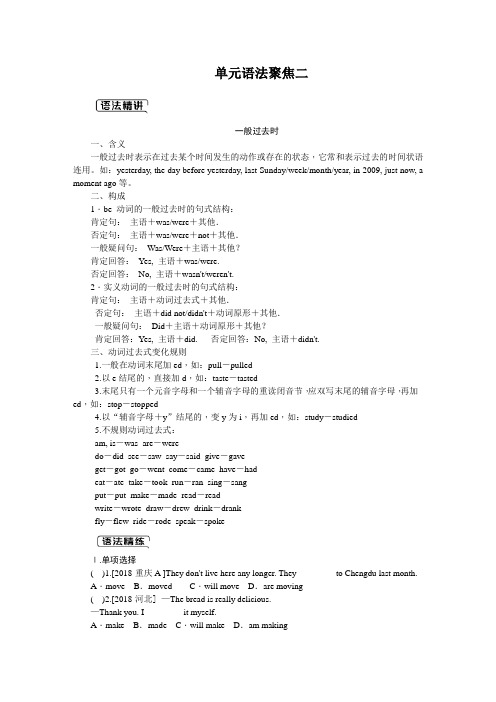
单元语法聚焦二一般过去时一、含义一般过去时表示在过去某个时间发生的动作或存在的状态,它常和表示过去的时间状语连用。
如:yesterday, the day before yesterday, last Sunday/week/month/year, in 2009, just now, a moment ago等。
二、构成1.be 动词的一般过去时的句式结构:肯定句:主语+was/were+其他.否定句:主语+was/were+not+其他.一般疑问句:Was/Were+主语+其他?肯定回答:Yes, 主语+was/were.否定回答:No, 主语+wasn't/weren't.2.实义动词的一般过去时的句式结构:肯定句:主语+动词过去式+其他.否定句:主语+did not/didn't+动词原形+其他.一般疑问句:Did+主语+动词原形+其他?肯定回答:Yes, 主语+did. 否定回答:No, 主语+didn't.三、动词过去式变化规则1.一般在动词末尾加ed,如:pull-pulled2.以e结尾的,直接加d,如:taste-tasted3.末尾只有一个元音字母和一个辅音字母的重读闭音节,应双写末尾的辅音字母,再加-ed,如:stop-stopped4.以“辅音字母+y”结尾的,变y为i,再加ed,如:study-studied5.不规则动词过去式:am, is-was are-weredo-did see-saw say-said give-gaveget-got go-went come-came have-hadeat-ate take-took run-ran sing-sangput-put make-made read-readwrite-wrote draw-drew drink-drankfly-flew ride-rode speak-spokeⅠ.单项选择()1.[2018·重庆A ]They don't live here any longer. They ________ to Chengdu last month.A.move B.moved C.will move D.are moving()2.[2018·河北]—The bread is really delicious.—Thank you. I ________ it myself.A.make B.made C.will make D.am making()3.[2018·天津]—Jerry, have you ever been to the Great Wall?—Yes. I________ there with my parents last year.A.go B.wentC.will go D.have gone()4.[2018·泰州]—Great changes have taken place(发生) in our hometown over the past years.—Yeah. Things ________ different when we were young.A.have been B.areC.will be D.were()5.—Look at the sign, “No photos!”—Sorry, I ________ see it.A.don't B.won'tC.doesn't D.didn'tⅡ.根据汉语意思完成句子1.去年他在加拿大。
七年级英语下册过去式不规则动词变化表
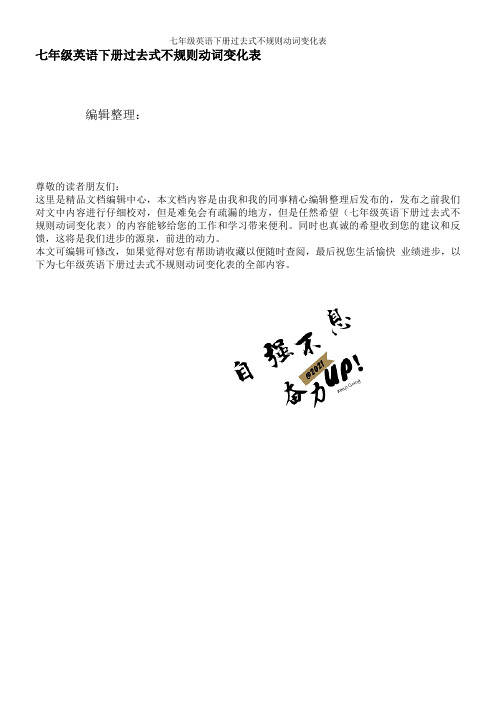
七年级英语下册过去式不规则动词变化表
编辑整理:
尊敬的读者朋友们:
这里是精品文档编辑中心,本文档内容是由我和我的同事精心编辑整理后发布的,发布之前我们对文中内容进行仔细校对,但是难免会有疏漏的地方,但是任然希望(七年级英语下册过去式不规则动词变化表)的内容能够给您的工作和学习带来便利。
同时也真诚的希望收到您的建议和反馈,这将是我们进步的源泉,前进的动力。
本文可编辑可修改,如果觉得对您有帮助请收藏以便随时查阅,最后祝您生活愉快业绩进步,以下为七年级英语下册过去式不规则动词变化表的全部内容。
七年级英语下册过去式不规则动词变化表。
冀教版七年级英语下册Unit 2课件
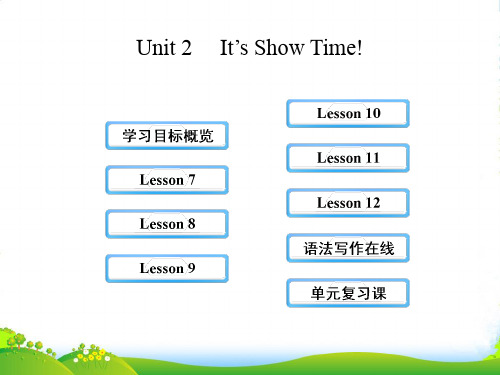
3. David watched a basketball game a long time ago. (改为一般 疑问句并作否定回答) —______ David ______ a basketball game a long time ago? —No, ______ ______ . 答案:Did; watch; he didn’t
Dear Jenny,
_____________________________________________________________ _____________________________________________________________ _____________________________________________________________ _____________________________________________________________ __________________________
谢谢观赏
You made my day!
我们,还在路上……
【习作练习】
李明暑假期间和父母去北京旅行,他们参观了历史博物馆 等名胜;看了中国的国粹——北京京剧;吃了北京的特产—— 北京烤鸭。请帮助李明给詹妮写一封电子邮件告诉她自己的北 京之行。
要求: 1. 词数: 80个左右(短文的开头和结尾已经给出, 不计入总 词数); 2. 根据所给信息可适当增加细节, 以使行文连贯。
We went to see the Beijing Opera in the theater. It’s really a Chinese treasure. I like the music and the colourful clothes. By the way, I also ate some delicious foods. Beijing Duck is a kind of wonderful food. I hope to eat more next time.
【最新】冀教版七年级英语下册Unit2 一般过去时用法
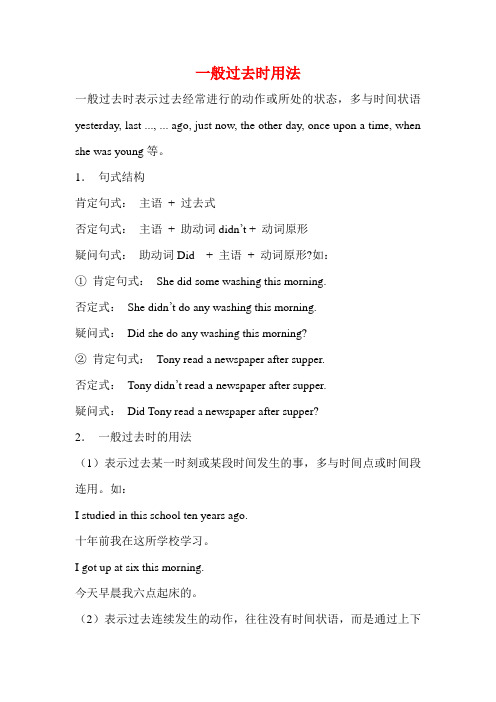
一般过去时用法一般过去时表示过去经常进行的动作或所处的状态,多与时间状语yesterday, last ..., ... ago, just now, the other day, once upon a time, when she was young等。
1.句式结构肯定句式:主语+ 过去式否定句式:主语+ 助动词didn’t + 动词原形疑问句式:助动词Did + 主语+ 动词原形?如:①肯定句式:She did some washing this morning.否定式:She didn’t do any washing this morning.疑问式:Did she do any washing this morning?②肯定句式:Tony read a newspaper after supper.否定式:Tony didn’t read a newspaper after supper.疑问式:Did Tony read a newspaper after supper?2.一般过去时的用法(1)表示过去某一时刻或某段时间发生的事,多与时间点或时间段连用。
如:I studied in this school ten years ago.十年前我在这所学校学习。
I got up at six this morning.今天早晨我六点起床的。
(2)表示过去连续发生的动作,往往没有时间状语,而是通过上下文来表明过去的含义。
如:She opened the window, looked out and found some birds in the sky.她打开窗户、向外看了看,看到空中有一些鸟。
(3)某些句子,虽然没有表示过去确定时间的状语,但实际上是指过去发生的动作或存在的状态,也应该使用过去时。
这一点要加以注意。
如:I didn’t know you were here.我不知道你在这里。
冀教版七年级英语下册《Unit2Lesson8 Marco Polo and the Silk Ro
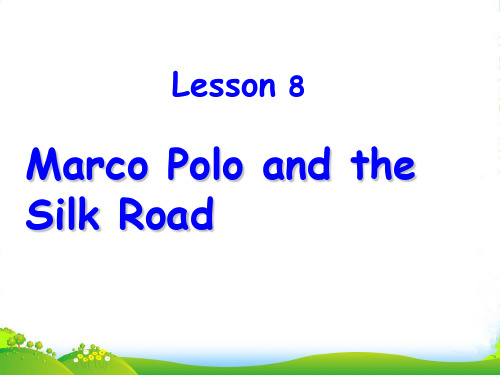
拓展:at one’s age of…在某人…岁的时候。 Eg: At her age of 30, she lost her son. 她 在30岁的时候失去ack a lot of silk, tea and other goods. bring back: 把…带回来。
Eg: I want to bring back the cat . 我本想把那只猫带回来.
注意:动词bring变过去式时是特 殊变化,由bring变为brought. bring back to… 把…带回到某地来
Please bring him back to school.
有古
一人
个云
在:
路“
上读
。万
”卷
从书
古,
至行
今万
,里
学路
习。
和”
旅今
行人
都说
是:
相“
辅要
相么
You made my day!
成读 的书
两,
件要
事么
。旅
。行
,
身
体
和
灵
魂
总
要
我们,还在路上……
3.In 1275, Marco Polo traveled to Beijing. travel to…去某地旅行。
Eg: I want to travel to America someday. 我想要有一天能够去美国旅行。 拓展:travel to…=have a trip to …
Eg: I want to have a trip to
- 1、下载文档前请自行甄别文档内容的完整性,平台不提供额外的编辑、内容补充、找答案等附加服务。
- 2、"仅部分预览"的文档,不可在线预览部分如存在完整性等问题,可反馈申请退款(可完整预览的文档不适用该条件!)。
- 3、如文档侵犯您的权益,请联系客服反馈,我们会尽快为您处理(人工客服工作时间:9:00-18:30)。
动词过去式的变化
动词的过去式有规则变化和不规则变化两种形式,一般是在词尾加ed构成。
不规则变化的过去式没有特定的规律,需要特别记忆。
过去式用于一般过去时态中。
【规则变化的过去式】
1. 一般情况下,在动词的词尾加ed构成。
如:
walk—walked, offer—offered, join—joined
2. 以不发音字母e结尾的,直接加d构成。
如:
live—lived, hate—hated, escape—escaped
3. 以重读闭音节结尾,并且词尾只有一个辅音字母的,要先双写这一字母再加ed。
如:
stop—stopped,
prefer—preferred
4. 以“元音字母+ y”结尾的直接加ed,以“辅音字母+ y”结尾的应先将y改为i再加ed构成。
如:
play—played, copy—copied, try—tried, carry—carried
【不规则变化的过去式】
1. 原形和过去式相同。
如:
花费cost cost
切割cut cut
打hit hit
伤害hurt hurt
2. 过去式字母o改为a。
如:
成为become became
来come came
3. 过去式为ought结尾的。
如:带来bring brought
买buy bought
战斗fight fought
想think thought
4. 过去式为aught结尾的。
如:抓住catch caught
教teach taught
5. 过去式将eep改为ept。
如:保持keep kept
打扫sweep swept
6. 过去式字母i改为a。
如:
下沉sink sank
游泳swim swam
7. 过去式字母ow改为ew。
如:知道know knew
投掷throw threw
吸blow blew
种植grow grew。
